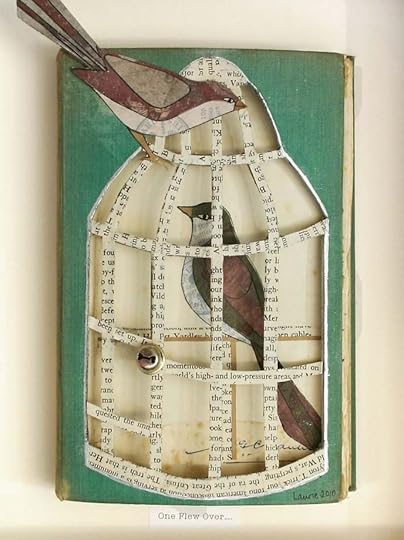B.V. Lawson's Blog: In Reference to Murder, page 172
November 8, 2017
Mystery Melange
The shortlist for the Irish Independent Crime Fiction Book of the Year was announced and includes:
Can You Keep A Secret?, Karen Perry
Here and Gone, Haylen Beck
Let the Dead Speak, Jane Casey
One Bad Turn, Sinéad Crowley
There was a Crooked Man, Cat Hogan
The Therapy House, Julie Parsons
On November 18 at the Waterstone's bookstore in Manchester, UK, a Crime Fiction Masterclass will offer advice and tutorials from crime experts including novelist, TV writer, and creative writing tutor, Erin Kelly; senior police officer, writer, and adviser to author Peter James, Graham Bartlett; Crime Scene Investigator and author of The Real CSI, Kate Bendelow; forensic pathologist and adviser to TV's Silent Witness and Midsomer Murders, Dr Stuart Hamilton; and novelist and practicing criminal lawyer, Neil White.
Indies First Small Business Saturday will be held on Saturday, November 25, and authors and local celebrities will volunteer at events in bookstores across the U.S., with publishers also offering special terms on books and exclusives. To find events close to you and help support independent bookstores, head on over to this interactive map.
The Tampa Bay Times asked bestselling crime fiction writers Ace Atkins, Tim Dorsey, and Lisa Unger what true crime they would write about if they wrote a nonfiction true crime book. All three authors will be part of the upcoming Times Festival of Reading November 11 at the University of South Florida St. Petersburg.
As the Sisters in Crime organization continues to celebrate its 30th anniversary, founder Sara Paretsky spoke with the Chicago Review of Books about the group's origins, obstacles, and offerings for women - and even men - who write and read crime fiction.
Author, editor, and blogger Martin Edwards some of the upcoming releases from the British Library's Classic Crime series that are worth keeping on your radar.
Our digital devices are proving to be a boon to modern police detection, but they may also pose a security threat to innocent users.
Amazon-owned audiobook platform Audible is offering up a freebie when you sign up for a 30-day trial: Arthur Conan Doyle’s Sherlock Holmes: The Definitive Collection narrated by the inestimable, all 71 hours and 58 minutes of it. In addition to narrating duties, Fry also provides introductions to each of the four novels and the five sets of short stories.
This week's crime poem at the 5-2 is "Confidence Man" by Peter M. Gordon. And, as Kevin Tipple notes on his blog, 5-2 editor Gerald So is actively seeking new poem submissions for December and beyond.
In the Q&A roundup, the Sons of Spade blog welcomed Ed Robinson, author of the Trawler Trash series featuring Meade Breeze; Criminal Element chatted with Linda Fairstein, author of the Alexandra Cooper novels and the Devlin Quick Mystery series for children, and C.E. also sat down with Ellen Crosby, author of the recently-published The Vineyard Victims; Omnioracious snagged Lee Child to talks about opioids, Jack Reacher, and The Midnight Line; Crime by the Book spoke with Pierre Lemaitre, the author behind the psychological thriller, Blood Wedding and the newly-released Three Days and a Life; and Omni Mystery News had a Q&A with Sheila Lowe, whose seventh mystery in her Claudia Rose Forensic Handwriting series, Written Off, is hot off the press.






 Related StoriesMystery Melange
Related StoriesMystery Melange
November 6, 2017
Media Murder for Monday

Monday greetings to all, with a top o'the week dose of the latest crime drama news:
MOVIES
The British Independent Film Awards Nominations were announced this past week, and the crime comedy-drama Three Billboards Outside Ebbing, Missouri, was a big winner, earning nods for Best British Independent Film, Best Director and Best Screenplay (Martin McDonagh), Best Actress (Frances McDormand), and Best Supporting Actor (Woody Harrelson). The film had previous won the Best Screenplay and People's Choice Award at the Toronto International Film Festival. It will be released in the US by Fox Searchlight Pictures on November 10, 2017.
The extraordinary story of two British sisters, Ida and Louise Cook, who became unlikely spies and heroines in helping Jews to flee Nazi persecution is to be told on the big screen. The film, The Cooks, is being produced by Donald Rosenfeld, former president of Merchant Ivory Productions, who made period classics such as Howards End, starring Emma Thompson. Having worked on four productions with Thompson – with a fifth project already under way – Rosenfeld would is eyeing casting her as one of the Cook sisters alongside fellow Oscar-winner Cate Blanchett.
In another spy project, Tom Hughes, who plays Prince Albert in ITV/Masterpiece’s Victoria, is joining the cast of Red Joan, the story of a grandmother exposed as the KGB’s longest-serving British spy. Based on the 2013 book by Jennie Rooney, the real-life story has Judi Dench playing Joan Stanley with Sophie Cookson (Kingsman: The Golden Circle) as the young Joan and Trevor Nunn directing from Lindsay Shapero’s script.
The Chris Evans political thriller The Red Sea Diving Resort, written and directed by Gideon Raff and co-starring Haley Bennett and Ben Kingsley, has had its international distribution picked up by STXinternational. In the movie, Evans plays an Israeli Mossad agent who runs a secret operation to smuggle thousands of Ethiopian Jews to safety in 1981 with his team of spies. They do this under the guise of a fictitious diving resort reminiscent of the same subterfuge used by the CIA to get Americans hostages out of Iran in Ben Affleck’s Oscar-winning film Argo.
Lily Collins has landed the highly coveted role of the former girlfriend of notorious serial killer Ted Bundy in Voltage Picture’s Extremely Wicked, Shockingly Evil, and Vile. She will star opposite Zac Efron, who was announced to play Bundy in Joe Berlinger’s thriller during Cannes. The film is told from Elizabeth’s (Collins) point of view during the multi-year period that Bundy hid his now-notorious murder spree from his live-in lover, played by Collins.
TELEVISION
CBS is developing the drama True Conviction based on the film documentary from Robert De Niro and Jane Rosenthal’s Tribeca Productions. Written by Shelton Kodish and Lopez, the project centers on three exonerated men in Dallas who team up to investigate cases of all kinds in an attempt to balance the scales of justice, while rebuilding their lives and navigating the newfound perils of a world that has moved on without them.
ABC has given a put pilot commitment to an untitled cop drama from Conviction co-creator Liz Friedlander and the MGC. Written and directed by Friedlander, the project is described as a character-driven procedural that follows the first female partnership in an elite division of the LAPD, where the two detectives use their particular set of skills to tackle the most high-profile cases as well as a system that doesn’t necessarily want them there.
Not to be outdone in the police procedural department, NBC has bought three police dramas from Chris Morgan (writer of the blockbuster Fast & Furious movie franchise): Darwin’s Blade, based on Dan Simmons’ novel, is being co-written by Morgan and Duane Swierczynski (who will co-executive produce) and centers on Darwin “Dar” Minor, a brilliant yet arrogant accident-reconstruction specialist who consults police on the bizarre cases no one else can solve; MSU, described as a high-octane police drama that follows an elite unit of LAPD motor cops on their dangerous assignments; and Walkaways, from Chicago Fire executive producers Andrea Newman and Michael Gilvary, which revolves around two disgraced NYC police detectives — an overachieving, hard-charging young woman and a brilliant but broken-down veteran — who are paired up and given one last chance to redeem themselves by solving the department’s toughest and most radioactive “walkaway” cases.
Fox is developing a potential new incarnation of its Emmy-winning 24 drama series that would have a female lead and take the real-time format of the terrorism-themed original and apply it to a different arena, criminal justice. The Killing writer-producer Jeremy Doner will write the script with Howard Gordon, who ran the original series. Details about the premise are sketchy, but the female lead is said to be a prosecutor who uncovers a legal conspiracy and has to work against the clock to save a death row inmate facing imminent execution whom she had helped prosecute but may be innocent.
Even before it’s arrived in North America by way of HBO, the BBC series Strike, based on author J.K. Rowling’s series of books following the adventures of private investigator Cormoran Strike has been given the go-ahead for a third series. The first series was comprised of three episodes covering the happenings in the first novel, The Cockoo’s Calling. The second series was two episodes and follows the second book, The Silkworm. With BBC ordering the third series, it will catch up to the third and final published book in the series, Career of Evil.
The atmospheric French crime drama Witnesses season 2 coming to the BBC. The new season starts when a woman rushing to catch her bus one morning steps onto the vehicle and rather than a group of disgruntled commuters finds it full of frozen corpses. Lieutenant Sandra Wincklerm (once again played by Marie Dompnier) is soon on the case and determines that all the fifteen dead men were previously involved with the same woman, Catherine Keemer, who is played by Audrey Fleurot of Spiral fame.
The Assassination of Gianni Versace: American Crime Story, the second installment of FX's ripped-from-yesterday's-headlines anthology series, will premiere on FX on Wednesday, Jan. 17. Versace tells the tale of the 1997 murder of fashion designer Gianni Versace and stars Darren Criss, Edgar Ramirez, Ricky Martin and Penelope Cruz as Versace's sister Donatella.
PODCASTS/VIDEO/RADIO
Quebec crime fiction writer Louise Penny was the keynote speaker at a literary festival in Quebec City where she opened up her writing career, receiving the Order of Canada, as well as her unlikely friendship with Hillary Clinton.
Suspense Radio Inside Edition had three special guests this week: author Jamie Freveletti talking about her book Blood Run; Diane Vallere, speaking about the 30 year history of Sisters in Crime; and USA Today bestselling author Pat Gussin talking about her latest book Come Home.






 Related StoriesMedia Murder for Monday
Related StoriesMedia Murder for Monday
November 3, 2017
FFB: The Albert Gate Mystery
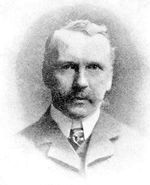 Louis Tracy (1863-1928) was born in Liverpool to an upper middle class family and educated at the French Seminary at Douai. Although he led a relative life of leisure, he also joined the 1st Volunteer Battalion of the Yorkshire Regiment and earned a full certificate for a captaincy by the age of 18, an unusual feat for the time. He turned his hand to journalism in 1884, writing for several newspapers and even worked his way up to part-ownership of the The Evening News before selling his share. He is said to have used some of the proceeds to run 23 soup kitchens during the depression-style winter of 1894, using some of those glimpses of poverty first-hand in his later novels.
Louis Tracy (1863-1928) was born in Liverpool to an upper middle class family and educated at the French Seminary at Douai. Although he led a relative life of leisure, he also joined the 1st Volunteer Battalion of the Yorkshire Regiment and earned a full certificate for a captaincy by the age of 18, an unusual feat for the time. He turned his hand to journalism in 1884, writing for several newspapers and even worked his way up to part-ownership of the The Evening News before selling his share. He is said to have used some of the proceeds to run 23 soup kitchens during the depression-style winter of 1894, using some of those glimpses of poverty first-hand in his later novels.
His first published work of fiction was a patriotic, somewhat propagandistic war-themed title, The Final War, which appeared as a serial from 1895 to August 1896 in Pearson's Weekly. After a visit to America for research, Tracy was due to write another serial for Pearson's, but fell ill. The publication drafted M. P. Shiel to help finish the work, which began a decades-long occasional, and sometimes prickly, collaboration between the two men. Tracy went on to publish prolifically, with some 80 or more books and numerous short stories, essays and articles, under his own name and the pseudonyms Gordon Holmes and Robert Fraser.
Tracy's fiction often featured American characters, a ploy to make it easier to sell his books on both sides of the Atlantic. This led to some head-scratching plotting such as setting The House of Peril in New York, even though it included a number of Tracy's familiar English detectives. In the revised English edition of 1924, (retitled The Park Lane Mystery), he reset the story in London. Tracy's strange love-hate relationship with his own country also led to pronouncements such as his comment to the Sunday Times that "American readers are better educated than the English," leading the reporter to sniff, "at least he writes novels about this country without the usual blunders of foreign writers."
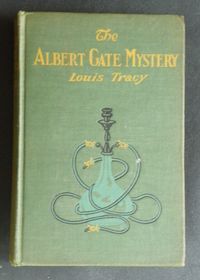 The Albert Gate Mystery from 1904, is actually set in London and features one of Tracy's regular protagonists, amateur detective Barrister Reginald Brett. The plot hinges around priceless imperial diamonds sent by the Sultan of Turkey to London, to be cut in the heavily-guarded Albert Gate mansion by experts under the protection of the British government. However, four Turkish officials are found dead in the house, and the diamonds disappear. The leading culprit is Jack Talbot, a young secretary at the Foreign Office who was overseeing the endeavor and also disappeared without a trace the evening of the murders.
The Albert Gate Mystery from 1904, is actually set in London and features one of Tracy's regular protagonists, amateur detective Barrister Reginald Brett. The plot hinges around priceless imperial diamonds sent by the Sultan of Turkey to London, to be cut in the heavily-guarded Albert Gate mansion by experts under the protection of the British government. However, four Turkish officials are found dead in the house, and the diamonds disappear. The leading culprit is Jack Talbot, a young secretary at the Foreign Office who was overseeing the endeavor and also disappeared without a trace the evening of the murders.
Brett reads about the events in the morning newspaper, detailing the high-ranking Turkish gentry, servants, guards, and fourteen expert Dutch diamond-cutters who have been detained at Scotland Yard, and how "the greatest living authority on toxicology" was among several medical personnel consulted. Brett's interest is piqued, but he doesn't get pulled into the mystery until the arrival of Lord Fairholme. It seems Fairholme's fiancee, Edith Talbot, refuses to marry him until her brother—who also happens to be the suspect Jack Talbot—is found and proved innocent.
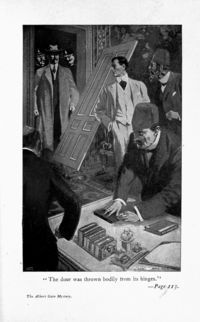 Brett's investigation has him chasing diamond thieves through England, France and Sicily with the somewhat-antagonistic help of Scotland Yard detective Winter, as well as royal messenger Captain Gaultier, Lord Fairholme and Edith. Along the way, the sleuth (who is described as brash, fearless, handsome, brilliant, a human dynamo and both "the smartest criminal lawyer in London" and "the cleverest analytical detective of the age") dons disguises and wades through political intrigue, treason among thieves, and a spirited horse-carriage chase scene, before the denouement.
Brett's investigation has him chasing diamond thieves through England, France and Sicily with the somewhat-antagonistic help of Scotland Yard detective Winter, as well as royal messenger Captain Gaultier, Lord Fairholme and Edith. Along the way, the sleuth (who is described as brash, fearless, handsome, brilliant, a human dynamo and both "the smartest criminal lawyer in London" and "the cleverest analytical detective of the age") dons disguises and wades through political intrigue, treason among thieves, and a spirited horse-carriage chase scene, before the denouement.
The character of Brett was compared to Sherlock Holmes during Tracy's day, although one reviewer said that "Mr. Reginal Brett is perhaps a trifle too Sherlockian in his rapid conclusions, although unlike the incomparable Holmes, he does not always permit his admiring audience to follow step by step in his course of reasoning." Brett has also been called a precuror of Lord Peter Wimsey, but as entertaining as he is at times, the writing and character aren't quite in the same league as Holmes and Wimsey.
There are some laugh-out-loud dated bits, too, such as "Brett expected to see a young, pretty and clever girl, vain enough to believe she had brains" (although the woman in question, Edith, turns out to be a fierce heroine in her own right). There are also some homages to other detective icons in the book, such as the small bust of Edgar Allan Poe in Brett's home and how he has adopted the French method of "reconstituting" the incidents, no doubt a nod to Vidocq, the founder and first director of the crime-detection Sûreté Nationale as well as the head of the first known private detective agency.







November 2, 2017
Mystery Melange
Congratulations go to the winners of this year's Crime Writers' Association Dagger Awards, announced this past week. The CWA Gold Dagger went to The Dry, by Jane Harper; CWA Ian Fleming Steel Dagger went to Spook Street, by Mick Herron; CWA John Creasey (New Blood) Dagger - Tall Oaks, by Chris Whitaker; CWA Non-fiction Dagger - Close But No Cigar: A True Story of Prison Life in Castro’s Cuba by Stephen Purvis; CWA Endeavour Historical Dagger - A Rising Man, by Abir Muckerjee; CWA International Dagger - The Dying Detective, by Leif G.W. Persson. translated by Neil Smith; CWA Short Story Dagger - “The Trials of Margaret,” by L.C. Tyler (from Motives for Murder, edited by Martin Edwards; and CWA Debut Dagger (for unpublished writers) - Strange Fire, by Sherry Larkin. (HT to The Rap Sheet)
The winners of the 2017 Ngaio Marsh Awards were also handed out over the weekend. Presented annually in New Zealand to recognize excellence in crime fiction, mystery, and thriller writing, this year's top honors went to The Last Time We Spoke by Fiona Sussman for Best Crime Novel (the first time that honor has gone to a female author); Dead Lemons by Finn Bell for Best First Novel; and In Dark Places by Michael Bennett for Best Non Fiction.
The latest novel by former journalist Michel Moatti, Do not be afraid, was awarded the 2017 Prix du Polar for the best French-language novel at the 22nd Polar Cognac Festival which celebrates the police genre in all its forms of expression; the prize for best international novel went to An ideal culprit, by Irish author Steve Cavanagh; and Phobie by Sarah Cohen-Scali was awarded Best Children's Novel.
New York Times best-selling author SJ Rozan will join with 10 other award-winning mystery authors this Saturday afternoon, November 4, from 1 to 5 p.m. at the Solley Theater, Arts Council of Princeton for “Mysterious Affair in Princeton,” a conversation with fans on how the perfect who-dunnit is created. The event is hosted by Princeton’s Cloak & Dagger Mystery Bookshop, along with the local chapters of Mystery Writers of America-NY and Sisters in Crime-Central Jersey.
On November 30, the Center for Fiction in New York City is bringing their Crime Fiction students center-stage as they read from the stories and novels they've worked on this spring and fall in the Crime Fiction Academy Slam. Workshop leader Alison Gaylin will host the event which includes readings, drinks, and a reception with the authors.
Details are being released for the bi-annual Noircon, which will return to Philadelphia in November 1-4 2018, and since registration is limited, you should snag your ticket sooner rather than later. Next year's event will once again celebrate every facet of the Noir genre, from literature to poetry to film to art to theater and bring together writers, artists, critics, and friends for panels, parties and open discussions. The conference begins with an opening night Noir at the Bar party at the Hotel Brotherhood, with other highlights of the program to include the awards presentation to conference honorees at the Friday night dinner where Walter Mosley will receive The David L. Goodis Award; Max Rudin (publisher,The Library of America) the Jay & Deen Kogan Award for Excellence; and Dana Polan (author & professor) the Anne Friedberg Award for Contributions to Noir and its Preservation. The International Association of Crime Writers N/A will also award the annual Dashiell Hammett Prize for Literary excellence for works published in 2017 at the Saturday luncheon.The Keynote Speaker is Geoffrey O'Brien (author, editor-in-chief- Library of America) and the Master Of Ceremonies is author and musician Charles Benoit.
Although it seems a tad early for the "best of" lists for 2017, both Publishers Weekly and The Strand Magazine have shared their lists of the best mysteries and thrillers of 2017.
In celebration of the upcoming release of the new Murder on the Orient Express movie based on one of Agatha Christie’s most popular works, Parade has partnered with HarperCollins to give away a collection of all 66 classic Christie detective novels to one devoted fan. Hop on over to this website for your chance to win.
Fresh on the heels of a campaign by several thriller authors to raise money for hurricane relief after devastating storms in Texas, Florida, and the Caribbean, a Go Fund Me page was set up by a group of authors (and Mystery Fest Key West) to raise money for Key West, which took a beating from Hurricane Irma. Check out the event here.
One to relay this week: Donald Bain, the pseudonymous author of the “Murder, She Wrote” novels, and Margaret Truman’s “Capital Crimes” mysteries, died on Saturday in White Plains. He was 82.
A big Happy Anniversary to the Double O blog for celebrating 11 years. The blog's mission is to promote "news and reviews of all things espionage–-movies, books, comics, TV shows, DVDs, and everything else," and proprietor Matthew Bradford has a done a fine job for a decade plus. Here's to 11 more!
Justice Scotland is exploring law and the arts in its beyond law series this year, kicking off with a look at the challenges of incorporating criminal law into dramatic writing through the theme of crime in fiction. The panel will consist of author Val McDermid; actress Frances Barber (Caroline Warwick QC in Silk); world class forensic scientist Sue Black; and noted advocate and Queen's Counsel, Donald Findlay QC.
Writing for Salon, Noah Charney profiled the "wild, made-for-TV story of criminology’s first secret agent," Eugene Francois Vidocq, which Charney also notes is "an HBO or Netflix series waiting to happen." Although Vidocq had his own checkered past, he is considered by some historians to be the father of modern criminology and has inspired many writers since, including Balzac, Victor Hugo, Alexandre Dumas, Edgar Allan Poe, Charles Dickens, and more.
The Marshall Project is presenting We Are Witnesses, a new collection of short videos that offers a look at the human cost of the U.S. prison system - there are now 2.2 million people in American jails and prisons; one in a hundred and fifteen adults is confined behind bars, and our inmate population is four times larger than it was in 1980. Taken together, the 19 videos in the project present a rare 360-degree portrait of the state of crime and punishment in the United States through the eyes of those who have had firsthand experience with the criminal justice system, including police officers, a prison guard, judges, parents of a murder victim, and ex-prisoners.
A recent auction lot in Dallas had a connection to the iconic true crime mystery of Lizzie Border and her infamous New England axe murder trial: a legal document by Lizzie as she was awaiting trial, granting temporary power of attorney to her sister and signed by both Lizzie and Andrew Jennings, the family lawyer who led the team that got her off the charge.
A hat tip to Mystery Fanfare for another interesting auction of note: the Royal Manual typewrite that Mickey Spillane used to write some of his works will be part of a lot headed for bidding on Wednesday, March 7, 2018 in New York, NY. It's condition is described as "signs of rust and some dust soiling, a few typing keys stick a bit" but "otherwise, in very good and working condition."
The Future of Forensics may include a DNA-generated composite sketch. The FBI’S Combined DNA Index System (CODIS) is one of the largest DNA databases on earth with more than 15 million DNA profiles stored in the system, but even this tool has limitations when it comes to solving crimes. CODIS works welll when the suspect is a convicted felon, but it isn’t much help when identifying first-time offenders, innocent victims, or anyone without a DNA profile stored in CODIS. That could with new software that would use a deeper analysis of DNA collected from a crime scene, providing information not currently contained within CODIS such as eye and hair color.
For a fun Day of the Dead/post-Halloween treat, check out the "Spookiest Ghost Stores from All Fifty States." (HT to Bill Crider)
This week's crime poem at the 5-2 is "Sunday Evening at Home" by Roger Netzer, and the latest story at Beat to a Pulp is "Nothing to Push Against" by Richard Prosch.
In the Q&A roundup, Crime Fiction Lover welcomed Chris Brookmyre, who has won both the William McIlvanney Prize for Scottish Crime Fiction and the Theakston Old Peculier Crime Novel of the Year for his book Black Widow; Criminal Element chatted with Kate White, author of Even If It Kills Her, as well as Tom Straw, author of Buzz Killer, and Linwood Barclay, author of Parting Shot; Craig Sisterson's latest "9mm Interview" featured Gordon Ell, author of various wildlife photography books who released his first murder mystery, The Ice Shroud, last year; David Lagercrantz, writer of the continuation novels in Steig Larsson's Millennium Series, sat down with the Telegraph of India; and the Belfast Telegraph spoke with Claire McGowan about becoming a thriller writer and her early addiction to books and libraries.






 Related StoriesMystery Melange
Related StoriesMystery Melange
October 30, 2017
Media Murder for Monday
 Monday greetings to all and hope you enjoy the latest roundup of crime drama news:
Monday greetings to all and hope you enjoy the latest roundup of crime drama news:
MOVIES
Steven Spielberg’s Amblin Partners is planning a film of the psychological thriller The Wife Between Us by the writing duo of Greer Hendricks and Sarah Pekkanen (the novel hits bookstores Jan. 9 from St. Martin’s Press). Described as being in the same vein as Girl on the Train, the female-centered thriller tells the tale of Vanessa, whose hot, hedge-fund husband Richard abandons their marriage, spinning her into wine-soused financial straits. When Vanessa learns that Richard is newly engaged to a woman she thinks of as her "replacement," it seems like the novel is headed straight for familiar erritory. But Hendricks and Pekkanen "flip expectations when they reveal exactly why Vanessa wants to stop the wedding ... and then they flip them again and again."
Scott Rudin Productions has acquired rights to the bestselling Jennifer Egan novel Manhattan Beach. Egan's book has the atmosphere of a noir thriller and follows a young woman named Anna into a world populated by gangsters, sailors, divers, bankers, and union men. After her father disappears under mysterious circumstances and the country is at war, Anna goes to work at the Brooklyn Naval Yard, where women are allowed to hold jobs that once belonged to the men who have gone off to fight. She becomes the first female diver, the most dangerous and exclusive of occupations, repairing the ships that will help America win the war. But one evening at a nightclub, she meets an old associate of her father with ties to New York’s criminal underworld, and she begins to uncover why and how he might have vanished.
Lionsgate acquired rights to E. Lockhart’s New York Times bestseller Genuine Fraud and tapped the Girls duo of Lena Dunham and Jenni Konner to adapt the book and produce the film. The plot of Genuine Fraud is said to be a bit tricky to summarize, but it’s essentially a psychological suspense novel about Jule West Williams, an orphaned young woman whose diabolical smarts are her ticket into a charmed life as she travels around the world and tries to stay one step ahead of those who have underestimated her skills ... which include a knack for accents and disguises.
Mads Mikkelsen will star in the action-thriller Polar, set in the gritty underworld of political assassins. Swedish director Jonas Åkerlund is helming Jayson Rothwell’s adaption of the Dark Horse graphic novel Polar: Came With the Cold by Victor Santos. Mikkelsen will play the world’s top assassin Duncan Vizla, a/k/a the Black Kaiser who is retiring when his former employer marks him as a liability to the firm. Against his will, he soon finds himself being hunted by an army of younger, faster, ruthless killers who will stop at nothing to have him silenced. Having no choice but to return to the shadowy life he thought he’d left behind, he must use his arsenal of deadly skills to outsmart his enemies and protect an innocent woman.
Nicolas Cage is set to star in Highland Film Group’s action thriller A Score To Settle, from Beautiful Boy director Shawn Ku. Cage stars as Frank, a convicted mob enforcer battling a terminal illness who is released from prison many years after taking the fall for a crime he didn’t commit. Now free, he sets out on a path for revenge against the people who wronged him.
In the new trailer for the Jaume Collet-Serra-directed thriller The Commuter, Liam Neeson once again makes use of his special set of skills to get out of a life-or-death situation — and this time it’s a Hitchcockian trip on a train as a mysterious woman (Vera Farmiga) proposes an enticing opportunity to Neeson’s unassuming character.
TELEVISION/STREAMING SERVICES
CBS has put in development the police drama Chasers, based on Lorenzo Carcaterra’s bestselling novel of the same name, from NCIS: Los Angeles creator Shane Brennan, Jerry Bruckheimer Television and CBS TV Studios. Written by Brennan, Chasers centers on a renegade vigilante law enforcement unit made up of "broken badge" ex-cops – those forced into early retirement – who unite to bring down the most vicious criminals in New York City.
Nathan Fillion is back on the beat at ABC in the cop drama The Rookie from writer Alexi Hawley, who previously worked with Fillion as an executive producer on ABC’s Castle. The Rookie is inspired by a true story and centers on John Nolan (Fillion), who leaves behind his cushy small-town life and moves to Los Angeles to become a police officer, where he finds himself as the oldest newbie in the LAPD.
Fox is developing a one-hour police procedural that hails from Virgil Williams, the co-writer and executive producer of Criminal Minds. Titled Hard Knocks, the series would follow a brilliant, male ex-con turned university criminology professor and a tenacious female detective who team up to tackle crime by combining unique insight into the criminal mind and superior investigative skills.
Ahead of this Sunday’s Season 5 finale, Showtime has ordered a 12-episode sixth season of its hit drama series Ray Donovan. A change of location also is in the works with Hollywood’s favorite celebrity fixer moving to the Big Apple from Los Angeles, where it has been based for the past five seasons.
A hat tip to The Rap Sheet for noting that lovers of Nordic crime fiction on television should be happy to hear that Season 2 of the Icelandic series Trapped — which producers promise will feature "an even more complex and challenging murder case" than the initial 10 episodes — has started filming in northern Iceland. Meanwhile, more plot details were forthcoming for the concluding season of the Swedish drama The Bridge, plus a trailer. The Bridge is scheduled to return to Nordic TV screens in January 2018.
Jeff Kober (Sully) is set for a key recurring role in CBS’ veteran crime drama series NCIS: Los Angeles. Kober will portray Harris Keane, who will play an important part in Hetty’s (Linda Hunt) past and their meeting will change Hetty’s future. His first episode will air November 5.
Netflix has released a new trailer for the upcoming original film Bright. Scripted by Max Landis and directed by David Ayer (Suicide Squad), the action-thriller takes place in an alternate present day in which humans live alongside magic folk like elves and orcs. Joel Edgerton plays the first orc to join the LAPD, and he’s paired with a human character played by Will Smith. Together, the two must navigate their own personal differences while uncovering a conspiracy that threatens the future of the world as they know it.
Ahead of the season 3 premiere, Blindspot has dropped an action-packed new trailer that spans the globe as well as offering a look at Jane’s (Jaimie Alexander) new, super-cool bioluminescent tattoos that will lead her and Kurt on thrilling new worldly adventures. The premiere kicks off in Venice and goes on to additional locations in Spain, Australia, and Morocco.
PODCASTS/VIDEO/RADIO
CBS This Morning featured John Grisham talking about the student debt crisis inspired his latest legal thriller, The Rooster Bar.
Two Crime writers and a Microphone hosts Steve Cavanagh and Luca Veste celebrated 50 episodes of the podcast by sharing audio of an event during a recent tour of Northern Ireland libraries; welcomed Noelle Holten of crimebookjunkie.com for book reviews; chatted with special guest David Torrans of No Alibis Bookshop; and talked about the brand new crime fiction festival "Noireland."
On Inside Thrill Radio, authors Micki Browning, J.J. Hensley and Isabella Maldonado discussed inside details from their high ranking police and Secret Service positions, as well as the paths that led them to turn to fiction.






 Related StoriesMedia Murder for Monday
Related StoriesMedia Murder for Monday
October 27, 2017
FFB: The Chink in the Armour
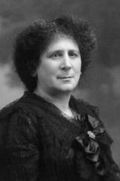 Marie Belloc Lowndes (1868–1947) was a prolific writer, with close to 70 novels and nonfiction works—as well as plays and short stories—published between 1898 and 1956. She came from a varied and eclectic background, with ancestors including the scientist Joseph Priestly; her mother, feminist Bessie Parkes Belloc; and her barrister father, himself the son of a well-known French painter. Marie and her family were surrounded by literary icons from early days, counting among them the Brownings, novelist Elizabeth Gaskell, Oscar Wilde, Henry James, and George Eliot. Marie's brother, Hilaire Belloc, became one of the best known writers of his day, and Marie married Frederic Lowndes, the editor of The Times.
Marie Belloc Lowndes (1868–1947) was a prolific writer, with close to 70 novels and nonfiction works—as well as plays and short stories—published between 1898 and 1956. She came from a varied and eclectic background, with ancestors including the scientist Joseph Priestly; her mother, feminist Bessie Parkes Belloc; and her barrister father, himself the son of a well-known French painter. Marie and her family were surrounded by literary icons from early days, counting among them the Brownings, novelist Elizabeth Gaskell, Oscar Wilde, Henry James, and George Eliot. Marie's brother, Hilaire Belloc, became one of the best known writers of his day, and Marie married Frederic Lowndes, the editor of The Times.
In her own writing, Marie Belloc Lowndes focused on psychological studies, character development and plots grounded in the ethical dilemmas of ordinary people. She was fascinated by contemporary crime, attended trials, and based several works on famous cases including Lizzie Borden and Jack the Ripper. The latter influenced The Lodger, about a Ripper-like killer named "The Avenger," first published as a short story in McClure's Magazine in 1911 and then a full-length novel in 1913. The Lodger was adapted as a play and later became the basis for Alfred Hitchcock's first major film.
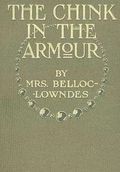 Although the suspense novels by Lowndes were mostly standalones, she did create a detective called Hercules Popeau, said to be the inspiration for Hercule Poirot. The Chink in the Armour, published in 1912, however, centers on beautiful blue-eyed Sylvia Bailey, who was married a 19 and a wealthy widow at 25. Sylvia is enjoying her solo life vacationing in a casino resort town near Paris with her friend Anna Wolsky and sporting an ever-present string of pearls as her badge of freedom.
Although the suspense novels by Lowndes were mostly standalones, she did create a detective called Hercules Popeau, said to be the inspiration for Hercule Poirot. The Chink in the Armour, published in 1912, however, centers on beautiful blue-eyed Sylvia Bailey, who was married a 19 and a wealthy widow at 25. Sylvia is enjoying her solo life vacationing in a casino resort town near Paris with her friend Anna Wolsky and sporting an ever-present string of pearls as her badge of freedom.
Being superstitious and naive, she visits fortuneteller Madame Cagliostra, who tells Sylvia she may never return to her own country and that the pearls will do her harm and lead her to the "House of Peril" unless she gets rid of them. Sylvia ignores the strange warning and finds herself fascinated by the casino atmosphere, its eccentric denizens and the attentions of Comte Paul de Virieu—until her friend Anna disappears.
The Chink in the Armour was also made into a film in 1922 (a silent movie retitled The House of Peril), directed by Kenelm Foss and starring Fay Compton, Roy Travers, Flora le Breton and A.B. Imeson.







October 25, 2017
Author R&R with Brian Stoddart
 Brian Stoddart is Professor Emeritus at La Trobe University where he served as Deputy Vice-Chancellor (Research) and as Vice-Chancellor. He took his first two degrees at the University of Canterbury in New Zealand where he first became interested in India, then completed a PhD at the University of Western Australia that looked at the rise of nationalism in south India. Along with his work on India, Brian has been a pioneering writer in sports culture and has produced books on Australian sport, Caribbean cricket and other related subjects. In addition, Brian Stoddart writes the Superintendent Le Fanu crime fiction series set in British India. A Madras Miasma and The Pallampur Predicament attracted excellent reviews and recognition while the third, A Straits Settlement, was longlisted for the 2017 Ngaio Marsh Award for best New Zealand crime novel.
Brian Stoddart is Professor Emeritus at La Trobe University where he served as Deputy Vice-Chancellor (Research) and as Vice-Chancellor. He took his first two degrees at the University of Canterbury in New Zealand where he first became interested in India, then completed a PhD at the University of Western Australia that looked at the rise of nationalism in south India. Along with his work on India, Brian has been a pioneering writer in sports culture and has produced books on Australian sport, Caribbean cricket and other related subjects. In addition, Brian Stoddart writes the Superintendent Le Fanu crime fiction series set in British India. A Madras Miasma and The Pallampur Predicament attracted excellent reviews and recognition while the third, A Straits Settlement, was longlisted for the 2017 Ngaio Marsh Award for best New Zealand crime novel.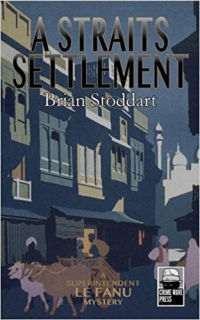 In A Straits Settlement, the third installment of the Chris Le Fanu Mystery series, the intrepid superintendent is promoted to Inspector-General of Police in 1920s Madras, which proves to be more boring than he had envisaged. Instead of pushing papers across his desk, Le Fanu focuses on the disappearance of a senior Indian Civil Service officer and an apparently unrelated murder. As the two incidents intertwine, the world-weary detective is drawn into the worlds of indentured labor recruitment and antiquities theft.
In A Straits Settlement, the third installment of the Chris Le Fanu Mystery series, the intrepid superintendent is promoted to Inspector-General of Police in 1920s Madras, which proves to be more boring than he had envisaged. Instead of pushing papers across his desk, Le Fanu focuses on the disappearance of a senior Indian Civil Service officer and an apparently unrelated murder. As the two incidents intertwine, the world-weary detective is drawn into the worlds of indentured labor recruitment and antiquities theft.
Brian Stoddart stops by In Reference to Murder today to talk about writing and research his novels:
Looking For Le Fanu
When the first book in the Chris Le Fanu series appeared, many readers loved its atmospherics of 1920s Madras in colonial India, and the city itself being as much a character as the protagonist and his colleagues on both sides of the crime fence. Even the Madras/Chennai media critics thought I had it “right”, a source of great satisfaction.
All those readers marvelled at the research behind the book and its successors, wondering how I had done it all.
Well, I cheated, in a sense.
I began writing, badly, at school in New Zealand, then went to the University of Canterbury in Christchurch to become an historian. Two things that happened back then now mark the Le Fanu series. First, I began re-reading all my sports books as an historian, realising that since the later nineteenth century sport has had a deep and meaningful impact on life globally. That began my pioneering sports history and culture work, but also determined that Le Fanu be a golfer and one of his assistants a cricketer. They reference that intellectual journey.
The second impact was even bigger. In first year I took a course in Pacific and Asian History at its first time of offering. That began a lifelong fascination with Asia. Then I took a specialist intensive course on modern India with Ian Catanach, one of those teachers and mentors who change your life. That led to a Masters degree, a fixation with India, and a high school teaching job. A year later Ian engineered a PhD scholarship for me at the University of Western Australia where I began researching the growth of nationalist politics in south India.
That research put me physically into what was then still called Madras, now renamed Chennai, and indirectly began the Le Fanu story thread. By the time I got there, I “knew” the city, its suburbs, streets, highlights and lowlights because I had studied it so closely. When I got off the ship in the Port of Madras, I knew where to go despite never having been there before. Years later I had the same sensation in Venice, “knowing” the place simply from having read Donna Leon.
I spent months then, over time, years in the Madras archives opposite Egmore Railway Station, ransacking files that recounted clashes between nationalists and police, and the ruminations of British Raj officials trying to handle it all. By definition I learned about police processes, methods, thinking and organisation in the British India context. That included the evolving, difficult relations between European officers and Indian other ranks.
Fortuitously, the archival work was supplemented by an important personal one. By complete chance the patriarch in the house where I stayed turned out to have been one of the first Indian Inspectors-General of Police in post-Independence Madras, and began his career during the period I was studying. So every night I returned to the house, sat outside and discussed the files I had been reading while he reminisced about being amidst the action.
My thesis was not about the police but I read everything possible on the Indian Police Service, an academic colleague wrote a book on the Madras Presidency police service that graced my shelves alongside a growing line of Indian police histories and autobiographies.
Then I went off and write about sport but retained the interest in India. A string of academically-oriented works followed, but that police interest remained while I read all the crime fiction I could for fun. Eventually I wrote the biography of an Indian Civil Service maverick, something I thought I would never do. Then came a memoir of living in Damascus just before the start of the present troubles, another literary form I had thought beyond me.
I never thought to write fiction, either, but with time to spare on foreign assignment in Cambodia, instead of reading crime fiction I decided to write some, so Le Fanu emerged.
At one level I followed that rubric of “write what you know”. I had always considered India a great potential crime fiction site for both historical and contemporary settings. All that research from all those archives and conversations was still sitting there, I “knew” Madras. My Indian Civil Service biography sprang the idea of having someone “odd” as protagonist to set up tensions and complexities. A Le Fanu had been in the Indian Civil Service in Madras during the nineteenth century and, of course, there was the twist provided by Sheridan Le Fanu who had rivalled Edgar Alan Poe as a mystery writer. Besides, a Le Fanu had also played rugby for England, so there was another strand.
While I returned physically to Madras, as I still call the place, to “see” it again as a crime setting, the Le Fanu cases, locations, combatants and all the rest were just there waiting to be disinterred. Some of the characters are even real historical ones, while the main “fictionalised” ones all have people and personalities discovered long ago lurking in behind.
Strictly speaking, then, years of research sits behind Chris Le Fanu. But the passage of time has allowed me to re-approach that research more dispassionately, allowing the story and stories to take precedence rather than that research. As people say, the biggest problem is that having done all that “research” you feel compelled to use it. That is less of a problem for me now because even though I am revisiting it, the research has settled in my mind.
The great bonus? A lot more people like Le Fanu than read the thesis on which he is based!
You can learn more about the author and his books (both fiction and nonfiction) via his website or follow him on Facebook and Twitter. His crime novels are available from Crimewave Press and all major booksellers.






 Related StoriesAuthor R&R with Elka RayAuthor R&R with David MalcolmAuthor R&R with J.J. Hensley
Related StoriesAuthor R&R with Elka RayAuthor R&R with David MalcolmAuthor R&R with J.J. Hensley
Mystery Melange
The Jesup Memorial Library in Bar Harbor, Maine, will become a crime scene for murder, mayhem and more at the third annual “Murder by the Book” mystery festival October 27-28. Tess Gerritsen (the Rizzoli & Isles series) will be the keynote speaker, joined by fellow authors Brenda Buchanan, Dorothy Cannell, Richard Cass, Sarah Graves, Vaughn Hardacker, Maureen Milliken, Katherine Nichols, Stephen Pickering, and Lynne Raimondo.
The 2017 Ngaio Marsh Awards will be followed by the first-ever Great Lit Quiz at Scorpio Books this Saturday, October 28. To celebrate NZ Bookshop Day, a team of book-enthusiasts will join together for an entertaining quiz of crime novels and other genres, and ticket holders will also be able to participate in the invitation-only Ngaio Marsh Awards cocktail party, where the finalists will be celebrated and the winners announced.
On October 29 from 8-11pm, Writerspace will be holding an online 2017 Halloween Mash with chances to win great prizes such as a Kindle, autographed advance copies plus special treats like gift cards and more. Plus, dozens of mystery and suspense authors will be dropping in to chat all during the evening.
The Mystery and Crime features coming up at the Texas Book Festival November 4-5 include Meg Gardiner and Jan Reid talking about "The Long Reach of Crime"; Attica Locke and Adam Sternbergh discussing "Small Towns, Simmering Tensions and Modern Western Crime"; Jeff Abbott and Bradley Spinelli on the "Accidental Detective"; and Alexandria Marzano-Lesnevich and Ben Blum chatting about "True Crime Close to Home."
November and December will bring two Mystery Author Extravaganzas hosted by the Chesapeake Chapter of Sisters in Crime. At each meeting—one in Maryland, one in Virginia—authors from SinC’s Chessie Chapter will talk about their publications in 2017, and Mystery Loves Company Booksellers will have copies of these titles on hand. The first of these events takes place Saturday, November 4 at the Howard County Public Library’s Miller Branch in Ellicott City, Maryland, with participating authors to include Donna Andrews, Maya Corrigan, Barb Goffman, Sherry Harris, Mary Ellen Hughes, Tara Laskowski, Alan Orloff, Kathryn O’Sullivan, Josh Pachter, Penny Clover Petersen, Susan Reiss, KM Rockwood, Verena Rose, Laura Ellen Scott, Harriette Sackler, Shawn Reilly Simmons, and Art Taylor.
The city of Kingston upon Hull in the UK will host Hull Noir 2017 from November 17-19, celebrating crime fiction from far and wide, including both local and international authors. Brit Lit author Ted Lewis is to be a key focus of the event, and Catherine Turnbull has a sneak peak of the author's legacy via a new biography of Lewis' pioneering writing and short and self destructive life.
Spinetingler Magazine announced it will begin regular publication of a print magazine with the first issue due November 2017 by Down & Out Books. "As is true in life, the events of the past have a tendency to influence our actions in the future," said Sandra Ruttan, co-editor of Spinetingler. "It is the support of our readers that has enabled us to return with this print edition. With their continued support we hope to be able to continue to bring exceptional short fiction and features to you for years to come." The Fall 2017 edition will feature original stories by Tracy Falenwolfe, Karen Montin, Jennifer Soosar, Nick Kolakowski, David Rachels, and BV Lawson. There are also author snapshots of Con Lehane, Rusty Barnes, Mindy Tarquini, as well as book features and reviews.
Berkeley's Bancroft Library has a very impressive California Detective Fiction Collection, numbering about 3,000 mystery novels set in the Golden State or written by California authors. For curator Randal Brandt, it's not hard to enjoy his work when he's surrounded by a first-edition copy of Dashiell Hammett’s The Maltese Falcon, Anthony Boucher’s first novel, 1937’s The Case of the Seven of Calvary, and much more.
Just in time for Halloween, Mystery Fanfare has a listing of spooky crime fiction titles that are themed around All Hallows' Eve.
With Kenneth Brannagh's new film adaptation of Murder on the Orient Express due in theaters November 10 in the U.S. (November 3 in the UK), journalist Caroline Frost stopped by the Crime Fiction Lover blog to point out some of the spots in Agatha Christie's native Devon where fans can spot the many clues to her books found around every corner of this deceptively tranquil spot on the English Riviera.
The long-running (33 years!) BBC show Crimewatch has been brutally dispatched and forensic television criticism suggests that several issues combined to end the life of the veteran franchise.
Although arsenic is often the poison of choice in popular whodunits from Sherlock Holmes to Agatha Christie, scientists are finding that in ultra-low dosage, and in the right form, this naturally occurring chemical element can be a potent force against cancer.
This week's crime poem at the 5-2 is "Mars Night" by Robert Arellano.
In the Q&A roundup, Celeste Ng spoke with the South China Morning Post about her follow-up book to her critically-acclaimed debut suspense novel Everything I Never Told You, which won an Asian/Pacific American Award for Literature; and Marcie Rendon, author of Murder on the Red River, chatted with the Stiletto Gang about switching from children's books to mysteries.






 Related StoriesMystery Melange
Related StoriesMystery Melange
October 23, 2017
Author R&R with Elka Ray
 Elka Ray is a Canadian/UK author and editor, whose first novel, Hanoi Jane, was published by Marshall Cavendish in English and DT Books in Vietnamese. That was followed by the suspense novel, Saigon Dark, which came out with Crimewave Press in November 2016, as well as a collection of short crime stories, What You Don’t Know: Tales of Obsession, Mystery & Murder in Southeast Asia. Elka is also the author and illustrator of a popular series of bilingual children’s books about Vietnam and lives with her family near Hoi An.
Elka Ray is a Canadian/UK author and editor, whose first novel, Hanoi Jane, was published by Marshall Cavendish in English and DT Books in Vietnamese. That was followed by the suspense novel, Saigon Dark, which came out with Crimewave Press in November 2016, as well as a collection of short crime stories, What You Don’t Know: Tales of Obsession, Mystery & Murder in Southeast Asia. Elka is also the author and illustrator of a popular series of bilingual children’s books about Vietnam and lives with her family near Hoi An.
Elka stops by In Reference to Murder to today to take some Author R&R and talk a bit about her writing:
My childhood was nomadic. No stranger to homesickness, I looked forward to growing up - and being in control of where I lived. As a result, place is important to me, both in life and in fiction.
Looking back on books I read long ago, the settings often remain clearer to me than the plots - that misty graveyard in Dickens' Great Expectations, the ominously dark Canadian lakes of Andrew Pyper's Lost Girls, the secret passages of Hogwarts in J.K Rowling's Harry Potter series... Little annoys me more than a book set in a place I know well and the author clearly doesn't.
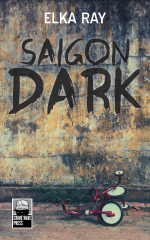 The three books I've published so far - Hanoi Jane, Saigon Dark and What You Don't Know: Tales of Obsession, Mystery & Murder in Southeast Asia - are all set in Southeast Asia, where I've lived for over 20 years. As a journalist and travel writer I used to cover a fair bit of ground. All these stories take place in spots I've lived, worked or holidayed.
The three books I've published so far - Hanoi Jane, Saigon Dark and What You Don't Know: Tales of Obsession, Mystery & Murder in Southeast Asia - are all set in Southeast Asia, where I've lived for over 20 years. As a journalist and travel writer I used to cover a fair bit of ground. All these stories take place in spots I've lived, worked or holidayed.
My crime/romance novel Newly Wed, Nearly Dead will be published by Seventh Street in early 2019. It's set in another place I know well, on Canada's beautiful Vancouver Island.
I once tried to set part of a story in a country I'd never been - Syria, I think it was. I read news reports and travel blogs. I watched Youtube videos. I googled everything from the weather in July to the smell in the market to the most common boys' and girls' names. I quizzed friends who'd worked there.
The scene sounded authentic - at least to me, who'd never been near the place. But how would I know? I ended up scrapping it.
I write fiction by instinct and fear too much research will bog me down. If I know the setting, I trust the story will fall into place - and the internet is there for the rest. Imagine having to go to the library and pore through dusty encyclopedias to confirm place names or the most popular bands in 1977. Imagine lugging home heavy medical textbooks to find appropriate causes of death. Google is both a writer's best friend and potential worst enemy, providing the ultimate excuse to procrastinate. Divorce law in Canada. Fast acting poisons. Fatal head wounds. How long until human hair rots away.
I hope I'm never connected to a real crime as the police would have a field day with my internet history.
You can read more about Elka and her books on her website at www.elkaray.com, or follow her on Facebook, Twitter or at elka.ray on Instagram. Elka's book Saigon Dark is available from Crimewave Press and via all major booksellers.






 Related StoriesAuthor R&R with David MalcolmAuthor R&R with J.J. HensleyAuthor R&R with Rich Zahradnik
Related StoriesAuthor R&R with David MalcolmAuthor R&R with J.J. HensleyAuthor R&R with Rich Zahradnik
Media Murder for Monday
 Monday means it's time once again for the latest weekly roundup of crime drama news:
Monday means it's time once again for the latest weekly roundup of crime drama news:
MOVIES
20th Century Fox bought the film rights to Taylor Adams' thriller, No Exit, with Logan scriptwriter Scott Frank attached to produce. The story follows college student Darby Thorne, who gets stranded in a blizzard at a highway rest stop for a night with four strangers. During the night, Thorne discovers a little girl locked in the trunk of one of the cars but she doesn’t know whose car. Without cell or phone reception and trapped by the snow, she must figure out who is the kidnapper.
Production has begun in New Orleans on Carol Morley’s crime drama Out Of Blue, which stars Jacki Weaver, James Caan, Patricia Clarkson, and Toby Jones. Billed as a neo-noir detective story and metaphysical mystery, the story centers on homicide detective Mike Hoolihan (Clarkson) who is called to investigate the shooting of a leading astrophysicist and black hole expert, and is affected in ways she struggles to comprehend. The film is originally based on Martin Amis’ novel Night Train, although the script penned by Morley has "taken on its own life." Aaron Tveit, Mamie Gummer, Yolanda Ross, Jonathan Majors and Devyn A Tyler round out the cast.
Naomi Watts has been set to star in The Wolf Hour, a psychological thriller from writer-director Alistair Banks Griffin. The project centers on June Leigh (Watts), a cultural icon and activist during the 1960s, now fallen from grace and a shell of her former self. An unseen tormentor begins exploiting her weaknesses and she must face her demons at the height of one of the darkest points in New York history: the summer of the the Son of Sam murders.
Brenton Thwaites (Oculus) and Ben Robson (The Boy) have signed on as the leads in the crime thriller A Violent Separation. The story is set in a quiet Midwestern town where Norman (Thwaites), a young deputy sheriff, covers up a murder at the hands of his older brother, Ray (Robson), but neither of the young men are prepared for what’s to come, including the passionate romance that blossoms between Norman and the victim’s younger sister, Frances (Alycia Debnam-Carey). As the investigation wears on, family bonds are tested with everyone desperately trying to do the right thing, all while doing the wrong thing.
Komixx Entertainment Ltd has optioned the worldwide screen rights to the "electrifying" YA thriller Captured by Kelly Anne Blount, featured on Wattpad. It is the second novel the independent production company has optioned from the author, the first being Under in 2016. Captured follows 17-year-old Abriana Vega who ends up blindfolded in a trunk of a car during a first date with a man she met online.
Melanie Liburd, who co-stars on Netflix’s Gypsy, has been set to join the cast of Brian Banks, a biopic starring Aldis Hodge and Greg Kinnear. The project tells the story of Banks (Hodge), an All-American high school football player committed to USC whose life was upended in 2002 when he was falsely accused of rape. Despite maintaining his innocence, Banks was railroaded through the system and sentenced to a decade of prison and parole. Kinnear plays his lawyer, while England-born Liburd will play Karina, a personal trainer Banks meets at the gym. After freaking out when he reveals he was accused of rape, she eventually believes in his innocence and helps clear his name.
A new trailer for Hangman features Al Pacino playing a detective chasing down a serial killer who likes to play a twisted version of Hangman. The pic also stars Karl Urban as profiler Will Ruiney.
TELEVISION/STREAMING SERVICES
ABC has put in development an hourlong gumshoe/family drama from Mila Kunis’ Orchard Farm Productions, Grey’s Anatomy executive producer William Harper, and ABC Studios. Written by Harper, the untitled project centers on a housewife who feels invisible to her husband and shunned by her teenage daughter but finds new purpose and confidence when she becomes the indispensable protégé of the sexy private investigator who moves in next door.
CBS is planning a reboot of Magnum P.I., an update of the classic 1980s Tom Selleck series set in Hawaii, which hails from Peter Lenkov, who has successfully revived Hawaii Five-0 and MacGyver. Co-written by Lenkov and fellow Hawaii Five-0 executive producer/showrunner Eric Guggenheim, the new Magnum P.I. will feature the same central quartet of characters but, instead of four guys, it will consist of three men and a woman, with Higgins (originally played by John Hillerman) reconceived as Juliet Higgins, a disavowed former MI:6 agent. The series will once again follow Thomas Magnum, a decorated ex-Navy SEAL who, upon returning home from Afghanistan, repurposes his military skills to become a private investigator with help from fellow vets Theodore "TC" Calvin and Orville "Rick" Wright as they take on the cases no one else will.
A "Nancy Drew" TV series is once again in the works, with NBC developing a new series based on the iconic novel series after CBS attempted such a project last season. The new series still hails from writers and executive producers Tony Phelan and Joan Rater and executive producer Dan Jinks, who developed the CBS version, but the new series follows the author of the most famous female teen detective book series who is thrust into a real-life murder mystery. In need of help, she turns to her two best friends from childhood, who were the inspiration for all those books, and the women who have a real axe to grind about the way their supposed best friend chose to portray them all those years ago. This will be a completely different version than the original at CBS. That project would have focused on Drew, now an adult who works as a detective for the NYPD. Sarah Shahi, who starred in the CBS’ drama Person of Interest since its second season, starred in the pilot as Drew but isn't currently attached to the NBC version.
Netflix recently announced it had picked up the script for Kate, a female-led action movie, and given it a $25 million budget. The concept is described as being in the same vein of Kill Bill and La Femme Nikita and centers on a woman who has 24 hours to solve her own murder. The project eyes a start date in April as Netflix quickly searches for the right director and star.
Bron Studios’ TV group has acquired rights to Danish author Sara Blaedel’s bestselling crime fiction book series centered on police detective Louise Rick. The plan is to adapt the novels as a TV series, with the first published Rick book The Forgotten Girls to serve as the backdrop for Season 1. The plot of that 2015 book from Grand Central Publishing kicks off when fresh corpse of an unidentified woman with a large scar on her face is discovered in the woods. Rick, the new Commander of the Missing Persons Department, and her partner set out to find her identity and killer. This leads them on a journey to uncover a decades-long unsolved mystery tied to a mental asylum.
The CW has put in development Dead Inside, an hourlong drama from writer Katie Lovejoy, Warner Bros. TV and Bill Lawrence’s studio-based Doozer Productions. Penned by Lovejoy, the story centers on an underachieving beat cop who survives an explosion that killed her hotshot detective big brother. When she starts seeing his ghost, it flips their sibling dynamic on its head and allows her to truly live her life for the first time, as they work together to help crime victims both living and dead, and figure out the unfinished business keeping his spirit on Earth.
Adding to its range of local-language offerings, Netflix has picked up The Mantis, a French serial killer thriller starring Carole Bouquet. The series centers on Jeanne Deber (Bouquet), aka The Mantis, a famous serial killer who terrorized France more than 25 years ago and is forced by the police to come out of solitary confinement to help hunt down a copycat. Deber agrees to collaborate with the investigation, but only on one condition: if her son, now a cop, will work by her side.
TNT’s The Alienist has a new trailer and a premiere date of January 22, 2017. The series is based on the best-selling novel by Caleb Carr and stars Daniel Brühl, Luke Evans, and Dakota Fanning as 19th century investigators on the trail of a Jack the Ripper-like serial killer. True Detective creator Cary Fukunaga wrote all eight episodes of the first season, and also executive produced.
PODCASTS/RADIO/VIDEO
Crime Corner host Matt Coyle welcomed USA Today bestselling Author Allen Eskens, who is also the recipient of the Barry Award, Minnesota Book Award, Rosebud Award, and the Silver Falchion Award and has been a finalist for the Edgar Award, Thriller Award, and Anthony Award. His debut novel, The Life We Bury, has been published in 16 languages and is being developed for a feature film.
Two great authors were featured on the latest Suspense Radio Inside Edition, as Daniella Bernett and Jeff Gulvin stopped by. Daniella Bernett's series features journalist Emmeline Kirby and the charming jewel thief Gregory Longdon, while Jeff Gulvin is the author of a series featuring John Quarrie, a Texas Ranger working in the 1960s.
Laura Caldwell, an author, attorney, educator, and motivational speaker, visited 2nd Sunday Crime with Libby Hellmann to discuss Caldwell's work and most recent anthology, Anatomy of Innocence, stories of the wrongfully convicted that are brought to life in collaboration with best-selling mystery and thriller writers.
THEATER
The Queen’s Theatre in Barnstaple will welcome the Classic Thriller Theatre Company from October 23-28 for their performance of Ruth Rendell’s A Judgement in Stone. The tale of deceit, despair and cover-up tells the story of Eunice, an illiterate housekeeper who joins a wealthy family and is forced to hide her shortcomings from her new employers with potentially fatal consequences. The impressive cast list includes Chris Ellison as Detective Superintendent Vetch; Robert Duncan as George Coverdale; Sophie Ward as Eunice Parchman; Antony Costa as Rodge Meadows; Deborah Grant as Joan Smith; and Ben Nealon as Detective Sergeant Challoner.






 Related StoriesMedia Murder for Monday
Related StoriesMedia Murder for Monday
In Reference to Murder
- B.V. Lawson's profile
- 201 followers




